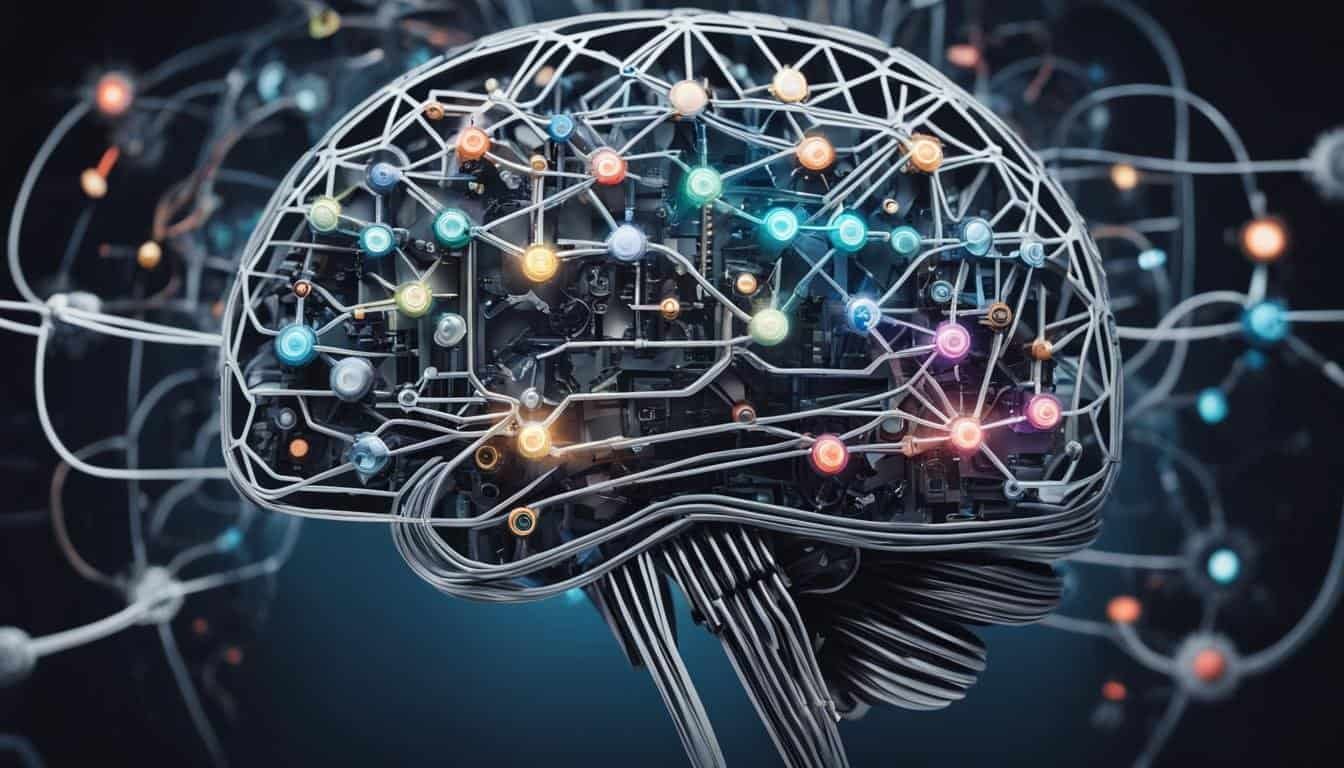Developing AI Skills: A Training Approach for the Workforce
As organizations face talent disruption, it’s essential to invest in developing AI skills within the workforce. Incorporating AI in learning and development can bridge the gap between employees’ potential and reaching business goals. AI uses machine learning and natural language processing to create personalized learning experiences and automate mundane tasks. It offers numerous exciting applications in learning and development, including customizing learning experiences, generating learning materials, providing smart tutoring, creating personalized growth plans, deploying support chatbots, translating learning content, offering detailed performance insights, and automating L&D administrative tasks.
Key Takeaways:
- Developing AI skills is crucial for bridging the gap between employee potential and business goals.
- AI in learning and development can automate tasks and personalize learning experiences.
- AI offers various applications, such as customizing learning, providing smart tutoring, and automating administrative tasks.
- Incorporating AI in training can enhance performance and improve efficiency in the workforce.
- Investing in AI skill development ensures organizations stay competitive in the evolving tech landscape.
Potential Applications of AI in Learning and Development
Artificial Intelligence (AI) has the potential to revolutionize learning and development, offering a wide range of applications that can enhance the educational experience for learners. By harnessing the power of AI, organizations can create personalized learning experiences, generate customized learning materials, and provide smart tutoring, among other possibilities.
One of the key advantages of AI in learning and development is the ability to tailor learning experiences to the individual needs of learners. By analyzing data on learners’ preferences, learning styles, and knowledge gaps, AI algorithms can deliver personalized content and activities that optimize learning outcomes. This approach can significantly improve engagement and knowledge retention.
Personalized Learning Experiences
AI enables the creation of personalized learning experiences by adapting content, pacing, and feedback to individual learners. By continuously analyzing learner performance data, AI algorithms can identify areas of weakness and provide targeted interventions to address them. This personalized approach helps learners progress at their own pace and target specific areas of improvement, leading to more effective learning outcomes.
Generating Learning Materials
Another exciting application of AI in learning and development is the automated generation of learning materials. AI algorithms can analyze vast amounts of data and generate relevant and engaging content customized to learners’ needs. This automation reduces the time and effort required to create learning resources, allowing educators to focus on other essential aspects of teaching.
Smart Tutoring
With AI-powered smart tutoring, learners can receive personalized guidance, support, and feedback tailored to their individual needs. Smart tutoring systems leverage AI algorithms to understand learners’ strengths, weaknesses, and learning preferences, enabling them to provide targeted assistance and adaptive instruction. This personalized approach enhances the learning experience by offering immediate feedback, relevant resources, and scaffolding to support learners through challenging concepts.
Personalized Growth Plans
AI can also facilitate the creation of personalized growth plans for learners. By analyzing learners’ performance data and career aspirations, AI algorithms can generate individualized recommendations for skill development and career advancement. These growth plans can provide learners with a clear roadmap for achieving their professional goals and enable them to take ownership of their learning journey.
Support Chatbots
AI-powered support chatbots are invaluable tools for providing instant assistance to learners. These chatbots can answer frequently asked questions, offer guidance, and resolve common problems. By automating responses to commonly encountered issues, support chatbots free up educators’ time, allowing them to focus on more complex and personalized interactions with learners.
Translating Learning Content
Language barriers can hinder access to educational materials for learners from diverse linguistic backgrounds. AI can bridge this gap by automatically translating learning content into multiple languages. By providing content in learners’ native languages, AI enables greater inclusivity and access to educational resources, fostering a global and diverse learning community.
Performance Insights
AI can analyze learner data to provide detailed performance insights. By leveraging machine learning algorithms, educators can gain valuable information about learners’ progress, strengths, and areas needing improvement. This data-driven feedback helps educators make informed decisions and implement targeted interventions that support learners’ growth and development.
Automating L&D Administrative Tasks
AI can automate various administrative tasks in learning and development, such as course enrollment, grading, and reporting. By streamlining these processes, AI frees up educators’ time, allowing them to focus on high-value activities like instruction and collaboration. Automating administrative tasks also ensures accuracy, timeliness, and consistency in managing educational programs.
Overall, the potential applications of AI in learning and development are vast and promising. From personalized learning experiences to automating administrative tasks, AI has the power to transform education and provide learners with tailored support, resources, and feedback. By harnessing the capabilities of AI, organizations can unlock new opportunities for effective and efficient learning.
The Benefits of Using AI in Learning and Development
Artificial Intelligence (AI) has revolutionized the field of learning and development, providing numerous benefits that enhance the educational experience for learners. By leveraging AI technology, organizations can improve learning outcomes, bridge skills gaps, promote transparency, and enhance team performance. Let’s explore these benefits in more detail:
Improving Learning Outcomes
AI enables personalized instruction and timely feedback, catering to the unique needs of individual learners. By analyzing data on learners’ progress, AI systems can adapt the learning experience to focus on areas of weakness and reinforce areas of strength. This personalized approach helps learners stay engaged, retain knowledge, and achieve better learning outcomes.
Bridging Skills Gaps
Identifying knowledge gaps is crucial for effective learning and development. AI platforms can analyze learners’ performance data and provide suggestions for targeted content that addresses specific skills gaps. This targeted approach allows learners to acquire the necessary knowledge and skills to fill the gaps in their expertise, ensuring a more comprehensive and efficient learning experience.
Promoting Transparency
Quotes are used to provide an example or highlight a key point:
“AI provides real-time data and analytics on learner performance, offering insights that promote transparency.”
AI platforms capture and analyze real-time data on learner performance, providing comprehensive analytics and insights into individual and group progress. This transparency allows both trainers and learners to identify areas for improvement and track performance metrics effectively. By having access to actionable data, organizations can make data-driven decisions to optimize training programs and improve overall performance.
Enhancing Team Performance
The collaborative nature of learning and development often involves team members working together towards a common goal. AI tools can enhance team performance by providing personalized training recommendations based on individual proficiency levels, learning styles, and shared objectives. This targeted approach fosters a stronger team dynamic, reduces skills gaps within the group, and ultimately improves overall performance.
Using AI in learning and development offers significant advantages that positively impact both learners and organizations. From personalized instruction to data-driven insights, AI technology has the potential to revolutionize the way we approach education and skill development.
Developing Interpersonal Skills and Domain Knowledge for AI
To integrate AI effectively into the workforce, companies recognize the importance of developing two crucial human skills: effective interpersonal skills and domain knowledge. Interpersonal skills encompass the ability to communicate effectively, engage meaningfully with others, and foster team cooperation. Meanwhile, domain knowledge equips workers with the necessary expertise to maximize the benefits of AI tools and make informed decisions while working with them.
Effective communication and collaboration are essential for successful AI integration within the workforce. When employees possess strong interpersonal skills, they can effectively convey ideas, share knowledge, and build rapport with both AI systems and their human counterparts. This fosters a collaborative environment where the workforce leverages the capabilities of AI tools to enhance productivity and drive innovation.
Effective Communication in the AI Era
AI tools are becoming increasingly prevalent in the workplace, transforming how organizations operate. To fully harness the power of AI, employees need to communicate effectively with these tools, understanding their functionalities and effectively conveying instructions. Additionally, clear and concise communication becomes crucial when interpreting the insights and recommendations provided by AI systems.
“Domain knowledge plays a crucial role in effectively leveraging AI tools. Employees who possess deep expertise in their respective domains can better understand how to incorporate AI into their workflows and make informed decisions based on the insights generated.”
The Importance of Team Cooperation
Collaboration among team members is vital for maximizing the potential of AI within the workforce. Effective team cooperation involves seamless integration between AI systems and human employees, allowing individuals to work synergistically to achieve goals. Open communication, mutual trust, and shared objectives can foster an environment where employees embrace AI as a valuable tool rather than a threat.
AI systems can assist in streamlining workflows, automating repetitive tasks, and providing insights that support decision-making processes. With strong team cooperation, employees can combine their interpersonal skills with AI’s capabilities, working together to achieve optimal results.
Domain Knowledge: Unlocking the Full Potential of AI
In addition to interpersonal skills, domain knowledge is crucial for effectively utilizing AI tools. Employees who possess deep expertise in their respective fields can leverage their domain-specific knowledge to ascertain how AI can best complement their work. By understanding the unique requirements and nuances of their industry, these individuals can provide valuable insights that enhance AI systems’ accuracy and relevance.
Furthermore, domain knowledge enables employees to interpret AI-generated recommendations and outputs, ensuring that the insights are appropriately applied within the context of their work. This combination of domain expertise and AI capabilities allows for informed decision-making and improved outcomes.
| Benefits of Developing Interpersonal Skills and Domain Knowledge for AI Integration |
|---|
| 1. Effective communication with AI systems and human colleagues |
| 2. Enhanced collaboration and teamwork |
| 3. Improved ability to interpret AI-generated insights |
| 4. Optimal utilization of AI tools within specific domains |
By prioritizing the development of interpersonal skills and domain knowledge, organizations can foster a workforce that seamlessly integrates AI tools into their daily operations. Such integration not only maximizes the benefits of AI but also empowers employees to adapt and thrive in the ever-evolving AI-driven work environment.
AI Literacy and Equity in the Workforce

As AI continues to shape the modern workforce, it becomes increasingly crucial to address the issue of AI literacy in order to promote equity. Unfortunately, AI tools tend to disproportionately benefit certain demographics, such as men with higher education and income levels.
To ensure equity and foster inclusivity in the AI-driven workplace, employers must prioritize raising AI literacy across all roles and levels of the workforce. This means providing equal access to AI-related education and training, not only for technical professionals but also for frontline and non-tech workers. By equipping employees with the necessary skills and knowledge, organizations can create a level playing field where everyone has the opportunity to thrive and contribute.
“AI literacy is the foundation for a more equitable and inclusive workforce. By providing ample opportunities for all employees to develop their AI skills, organizations can harness the full potential of AI while minimizing the risk of exacerbating existing disparities.”
Raising AI literacy goes beyond technical proficiency; it involves developing a broad understanding of AI’s impact on the workplace, its potential benefits and challenges, and its ethical implications. AI literacy empowers individuals to make informed decisions in using and collaborating with AI tools, leading to more effective and responsible AI tool usage.
Furthermore, organizations should focus on creating a culture of continuous learning that encourages employees to embrace AI literacy as an essential component of their professional development. By incorporating AI education and training initiatives into their learning programs, employers can ensure that AI literacy becomes a fundamental part of the workforce skill set.
Benefits of AI Literacy and Equity in the Workforce:
- Promotes fairness and inclusivity in the use and deployment of AI technologies.
- Fosters better collaboration and productivity among diverse teams.
- Reduces the risk of bias and discrimination in AI algorithms and decision-making processes.
- Enables individuals to leverage AI tools effectively to streamline workflows and enhance job performance.
By prioritizing AI literacy and equity, organizations can not only capitalize on the potential of AI but also cultivate a more inclusive and harmonious work environment for all employees.
Let’s analyze a real-world scenario to better understand the importance of AI literacy and equity:
| Scenario | Impact of AI Literacy and Equity |
|---|---|
| Company A implements an AI tool for performance evaluations. |
|
Future-Proof Skills in the AI Era
In the era of artificial intelligence (AI) and automation, it is essential for professionals to develop future-proof skills that will make them valuable assets in the workforce. While AI technology continues to advance, there are certain soft skills, also known as human skills, that cannot be easily replicated by machines.
Soft skills encompass a range of interpersonal abilities that are highly sought after in the workplace. These skills include creativity – the ability to think outside the box and come up with innovative solutions, problem-solving – the capacity to analyze complex issues and find effective solutions, and advanced communication – the skill to clearly and persuasively convey information to others.
Employers should recognize the importance of developing these soft skills in their workforce. By focusing on enhancing these abilities, organizations can ensure that their employees can contribute effectively in the AI era. In addition to soft skills, there are certain attitudes that are crucial for success, such as flexibility – the ability to adapt to new technologies and changing work environments, agility – the skill to quickly learn and apply new information, and an interest in continuous learning – the desire to constantly acquire new knowledge and skills to remain up-to-date.
“Soft skills are becoming the differentiating factor in a world increasingly powered by AI. We need employees who can collaborate, problem-solve, and communicate effectively to drive innovation and success.”
– Sarah Johnson, HR Director at TechTech Inc.
As AI technology continues to evolve and reshape industries, professionals who possess these future-proof skills will have a competitive edge in the job market. Not only do these skills complement the capabilities of AI, but they also enable individuals to navigate complex situations, collaborate effectively, and provide a human touch that machines cannot emulate.
Employers play a vital role in developing these future-proof skills within their workforce. Through targeted training programs, mentoring opportunities, and fostering a culture of continuous learning, organizations can ensure that their employees are equipped with the necessary tools to thrive in the AI era.
Comparison of AI Skills and Future-Proof Skills
| AI Skills | Future-Proof Skills |
|---|---|
| Algorithmic efficiency | Creativity |
| Data analysis | Problem-solving |
| Natural language processing | Advanced communication |
| Machine learning | Flexibility |
| Automated decision-making | Agility |
| Pattern recognition | Continuous learning |
It is important for professionals to recognize the value of future-proof skills in the AI era and actively cultivate these abilities. With the right combination of soft skills, attitudes, and a commitment to continuous learning, individuals can future-proof their careers and thrive in an increasingly AI-driven world.
Workers’ Role in Shaping AI Integration
Workers play a critical role in shaping the successful integration of AI into the workforce. To ensure a smooth transition and maximize the benefits of AI, employers must actively involve their employees in this process. Doing so requires raising awareness of AI’s potential impacts, providing access to education and training, and empowering workers to make informed decisions about their careers.
Employers should offer diverse options for education and training, enabling workers to develop the necessary skills to effectively navigate AI integration. This may include programs focused on AI literacy, technical training, and interpersonal skills development.
Furthermore, employers must respect employees’ choices when it comes to upskilling and reskilling programs. Workers should have the freedom to pursue the areas of AI that align with their interests and career aspirations. This approach ensures that the integration of AI benefits both the workforce and the organization as a whole.
By creating clear career benefits from participating in education and training initiatives related to AI, employers can incentivize workers to take advantage of these opportunities. This may include providing career advancement opportunities for individuals who acquire and demonstrate AI skills, recognition for AI-related accomplishments, or increased job security in an AI-driven workplace.
“Workers need to be at the forefront of the AI integration process. They bring valuable insights and perspective that can enhance the way AI is implemented within the organization.”
Ultimately, by involving workers in shaping AI integration, employers can harness the full potential of AI while ensuring a smooth and positive transition for the workforce.
The Need for New Education and Skilling Investments
The impact of AI in the coming years necessitates a significant focus on education and skilling investments. Employers must recognize the profound influence of AI and take proactive measures to prepare their workforce for the future.
One key aspect of this preparation is prioritizing AI literacy. As AI becomes more prevalent in various industries, it is crucial for employees to acquire a basic understanding of AI concepts and technologies. AI literacy empowers individuals to make informed decisions, effectively collaborate with AI systems, and prevent equity gaps in AI tool usage.
In addition to AI literacy, developing durable skills is imperative for withstanding the rapidly evolving job market. Durable skills, such as creativity, problem-solving, and adaptability, are essential for future-proofing the workforce. These skills enable employees to navigate uncertainties, embrace innovation, and remain flexible in the face of AI-driven changes.
Putting Employees in the Driver’s Seat
Empowering employees to take control of their learning journeys is another significant component of education and skilling investments. Companies should provide opportunities for self-directed learning, allowing employees to explore AI-related topics, technologies, and applications that align with their career aspirations.
By fostering a culture of continuous learning, organizations can not only enhance employee engagement and satisfaction but also develop a dynamic workforce that adapts to the demands of the AI era. Encouraging employees to pursue additional education and training in AI-related fields can equip them with the necessary knowledge and skills to embrace AI-driven opportunities.
Investing in education and skilling is not a one-time effort but an ongoing commitment to enable employees to thrive in the AI era. By providing access to AI literacy training and facilitating the development of durable skills, organizations can unlock the full potential of their workforce and drive sustainable success.
In summary, the increasing impact of AI underscores the need for new education and skilling investments. Employers should prioritize AI literacy, foster the development of durable skills, and empower employees to take charge of their learning journeys. By doing so, organizations can bridge the gap between the potential of AI and the capabilities of the workforce, ensuring a prosperous future in the AI-driven world.
Conclusion
Developing AI skills through training and incorporating AI in learning and development is crucial for preparing the workforce for the future of work. With the numerous applications of AI, organizations can personalize learning experiences, automate administrative tasks, and enhance team performance. To ensure successful AI integration, employers must invest in developing interpersonal skills, domain knowledge, AI literacy, and durable skills. By prioritizing continuous learning and adaptability, companies can stay competitive in the evolving tech landscape.
The future of work will heavily rely on AI integration, and organizations that embrace this technology will have a significant advantage. By providing training and development opportunities for AI skills, employers can equip their workforce with the knowledge and tools necessary to thrive in an AI-driven world. Alongside technical skills, the development of interpersonal skills will be essential for effective collaboration and communication in AI-powered work environments.
To bridge the gap between human workers and AI, it is vital to foster a culture of lifelong learning. Continuous personal and professional development will enable workers to adapt to new challenges and take advantage of emerging opportunities. As AI becomes increasingly integrated into various industries, the demand for individuals with AI skills will continue to grow. By investing in workforce training and skill development, organizations can prepare their employees for the future and create a resilient and agile workforce.
As we move forward, the successful integration of AI into the workforce will require a strategic approach. Employers must recognize the importance of investing in AI literacy, promoting equity, and providing equal access to AI education and training. By embracing AI technologies and focusing on the development of essential human skills, organizations can unlock the full potential of their workforce and navigate the future of work with confidence.






